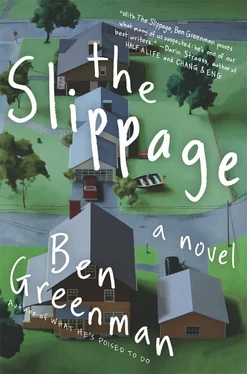He never got to say what it wasn’t. Emma clapped a hand over his mouth and, with her other hand, tugged at his belt. He excused himself and leaned on the bathroom counter weakly, telling himself that he was in the grip of excitement rather than fear. When he came out of the bathroom, the nice girl was naked on top of the sheets. He breathed in sharply, as a reflex, and went to his knees by the edge of the bed, where he put his mouth on her breast. She gasped and he moved down, away from the source of the gasp.
He woke before her. There was a noise somewhere in the hotel, a shallow scraping. He tried to block it out without success. Emma shifted and frowned, opening her eyes, and William saw her seeing him. What did she see? A man who was in bed with another woman, feeling so many things that it wasn’t easy to locate regret among them. He was sure that her face would have been cool to the touch if he had been brave enough to reach out.
The night had made not the slightest difference to their manner or appearance. They got dressed and went downstairs for breakfast. The hostess, an overripe young woman stuffed hopefully into black pants and a white dress shirt, waved a merry hand across the buffet: waffles, pancakes, omelets, donuts, cereals.
Emma clapped. “I was dreaming of this,” she said.
“Was it was a good dream?” the hostess said.
“Not this good.”
“We keep her dreams on a tight budget,” William said.
William joked that way with Louisa, sometimes with desperate regularity, but she reacted like transition lenses: the brighter his tone, the darker the look she returned. Emma laughed easily. She was tired of some other man.
Later, in the lobby, she looked small inside a green armchair. A cherrywood staircase behind her led up into the hotel, toward the room they were done with forever. “I wish we didn’t have just a single morning,” William said.
She frowned at him and fretted the button of her coat. “Don’t say that,” she said. “You’re not part of my life. My life is fine as it is. It’s life, right? Not worth escaping but hard to completely embrace. So I do what I have to do.” Courage pooled in her eyes.
He went home after breakfast. She saw him out to the edge of the curb and shook his hand crisply, as if she had done business with him. From the plane, the city receded beneath him until it was, to his relief, unreadable.
Back at home Emma was a constant presence in William’s mind, a layer beneath everything, and so he moved rapidly to conceal it. He made good on the deck show, ordering the Western-themed lanterns, though when they arrived in the mail they were flimsier than he had remembered. Other attempts to take his mind off Chicago fell similarly short. He bought himself a new alarm clock, but the face was too bright and he could not sleep with it beside his bed. He upgraded his car stereo, but there were not enough gradations in the volume dial and music was either too soft at the fourth click or too loud at the fifth. He told himself that he was more alive to the world around him, and then, when that idea came to seem too romantic, that he was simply agitated. He waited for ordinary life to seal him in again, and a month later the alarm clock’s glare was no longer keeping him awake. He commended time for passing.
But now, the unthinkable had happened: a year had gone by and her letter was open on the kitchen counter, heating up the place. “Dear William,” it said. “I have some very surprising news I need to share with you. I am moving. Stevie got transferred to a new division of Arrow that’s based in your town. We will be neighbors. And when I say neighbors, William, I mean near neighbors. I looked up the address, and it’s right across the street. Life’s funny sometimes, and sometimes it’s anything but. See you soon.”
He read the note a second time and let his finger rest on words he thought he was supposed to understand. He threw the rest of the mail away but put the letter in his pocket, and when he reached the bedroom, he transferred it quickly to the drawer in the table beside his bed. He could not see it but he could sense it there still, and so he lay in bed and forced his mind to rise, like mist off a river, and hover at the top of the bedroom, before it passed through the ceiling. He could take the sky, bit by bit, until he saw it all stretched out before him: the houses, the cars, the lights twinkling in the dark carpet of the town at night. And so he rose and the letter did not. It stayed there in the bottom of the table, a small white rectangle that shrank until it was a scrap, a shred, nothing or even less than that, so long as he stayed aloft.
Part IV. THE NEIGHBOR POLICY
William waited for signs of life in the house across the way. At first he was casual about it, angling his kitchen chair during meals so he could see out the front window. It looked just like a house: nondescript cream-colored façade punctuated by a few shuttered windows. A bright green vine climbed calligraphically alongside the front door. The first Saturday he set an alarm for seven and walked Blondie up and down the street, a surveillance pass. The Monday after that, he invented an excuse to go out to the garage, where he pushed the weightlifting bench up against the small vertical window and remained at his post until Louisa called him in to watch TV with her. Then, at ten or so on the morning of the second Saturday, the front door disgorged a young woman. She knelt by a green puff of shrubbery, rearranged something William couldn’t see, and then made her way along the narrow path toward her garage. It was Emma, unmistakably, if only from the wide swing of her right hip when she walked. She touched the handle of her door, tested it for tightness, appeared to adjust it slightly, and passed back inside the house. He had seen it all from his post, through the dusty pane of duty glass. The whole thing had taken ten seconds, tops.
Sunday, errands; Monday, work; Tuesday-to-Friday’s assault on meaningful memory. Then Saturday again, and a rare rain that pattered on the glass door that led from the kitchen to the deck. The weather cleared at lunchtime, and Louisa went to run errands, and that was his cue to walk across the street and knock on the door. Emma answered. Her hair was shorter than before, and slightly darker. Her face was holding back nearly everything. He sensed someone behind her. “Hello,” she said. “Can I help you?”
“Hi,” he said. “Bill Day.”
“Bill?” she said, smiling uncertainly. A book was wedged under her arm. He didn’t recognize the cover and couldn’t see the full title — something about a mirror.
“William, I guess. Most people call me William, though whenever I meet new people, I try to go by Bill. Sounds friendlier. But it never seems to stick. Anyway, I live right across the way there.” He lifted an index finger and pointed it, so deliberately that no reasonable observer could have perceived it as casual.
“Nice to meet you,” she said.
“You’re moving in?” He heard his own foot dragging across the bricks of the walk.
“Trying to. We’re box people at the moment.”
“Completely,” he said, not sure what he was agreeing with.
A man’s voice came from inside the house. “Who is it?”
“A neighbor.”
The man appeared beside her, wearing tight blue metallic shorts. “Hey,” he said. “I’d shake your hand but I’ve been oiling up my bicycle so I can take a ride.” He laughed at a joke that maybe he thought he had made. Emma had described him as tall, or at least compared him to someone tall. He was not. He put his arm around his wife. “Stevie,” he said.
“William,” William said.
“Emma,” Emma said.
Читать дальше












